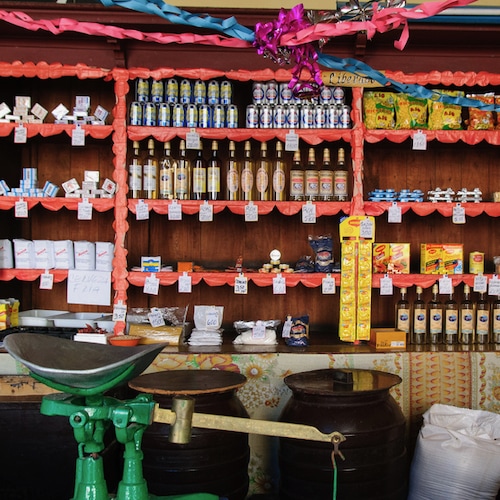Summer comes to an end, and some of us will start commuting again. Others will desperately wonder how to fill up the ‘spare’ time from their considerably shorter commute between the breakfast table and the home office.
For the former: we know exactly what will make this time enjoyable, but nevertheless productive (yes, this is still the mot d’ordre, the pandemic unfortunately didn’t change that).
For the latter: some might argue this is a unique opportunity to pick up a new hobby, spend time with your loved ones and so on, to get your life/work balance under control. That would be a good idea. If you are however a fellow anthro-holic and can’t imagine a type of fun that doesn’t include anthropology, we also have you covered.
Our intern and budding anthro-holic has rounded up all of the podcasts she most enjoyed listening to this summer, curtesy of our friends at the New Books Network.
The Fixer: Visa Lottery Chronicles
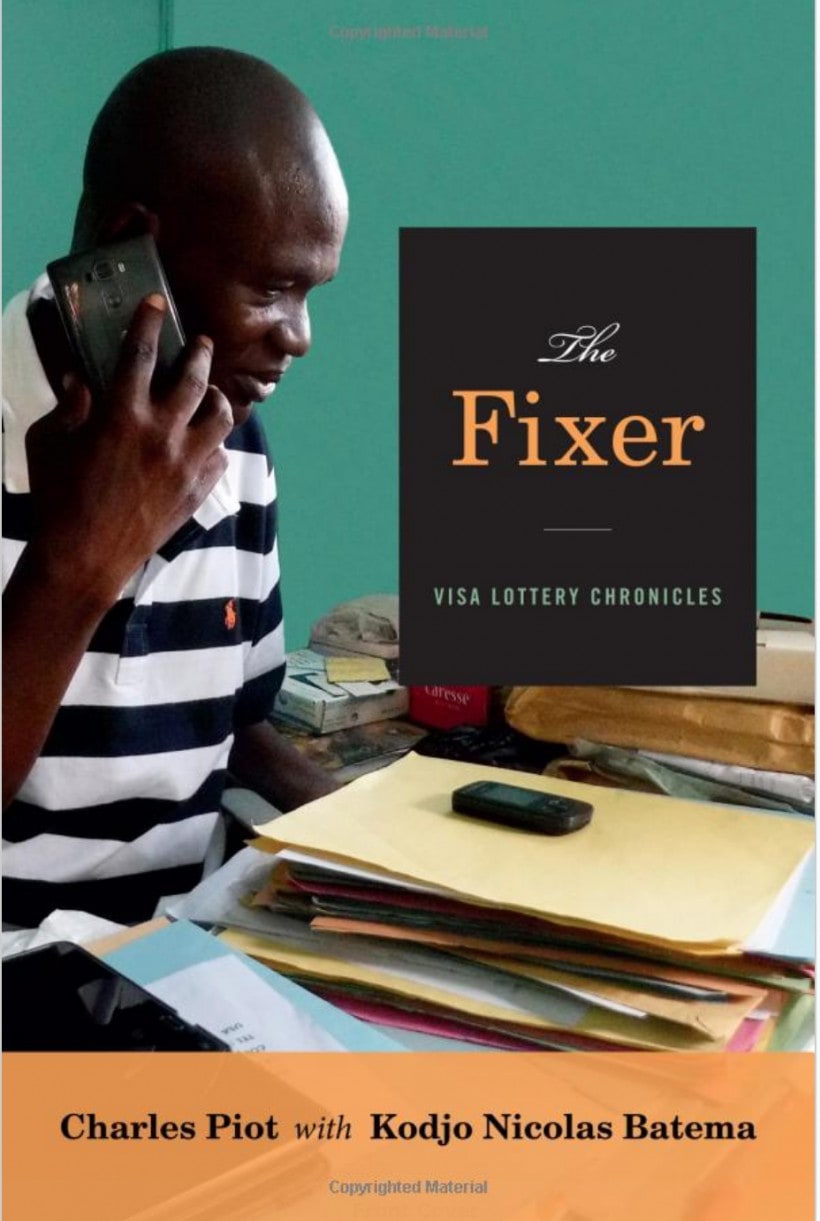 by Charles Piot (Duke University Press, 2019).
by Charles Piot (Duke University Press, 2019).
In the West African nation of Togo, applying for the U.S. Diversity Visa Lottery is a national obsession, with hundreds of thousands of Togolese entering each year. From the street frenzy of the lottery sign-up period and the scramble to raise money for the embassy interview to the gamesmanship of those adding spouses and dependents to their dossiers, the application process is complicated, expensive, and unpredictable.
In The Fixer: Visa Lottery Chronicles (Duke University Press, 2019) Charles Piot follows Kodjo Nicolas Batema, a Togolese visa broker—known as a “fixer”—as he shepherds his clients through the application and interview process. Relaying the experiences of the fixer, his clients, and embassy officials, Piot captures the ever-evolving cat-and-mouse game between the embassy and the hopeful Togolese as well as the disappointments and successes of lottery winners in the United States. These detailed and compelling stories uniquely illustrate the desire and savviness of migrants as they work to find what they hope will be a better life.
This interview is part of an NBN special series on “Mobilities and Methods.”
Charles Piot is a Professor of Cultural Anthropology and African and African American Studies at Duke University.
Interview by Alize Arıcan.
Listen here!
From Boas to Black Power
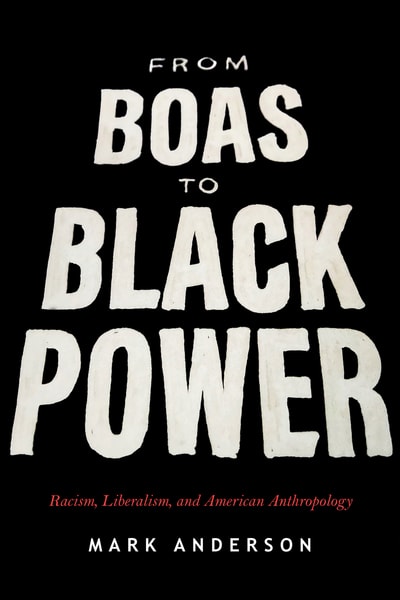 by Mark Anderson (Stanford University Press, 2019).
by Mark Anderson (Stanford University Press, 2019).
Mark Anderson’s From Boas to Black Power: Racism, Liberalism and American Anthropology is at once a story about US anthropology and US liberalism from the 1930s to the 1960s.
By interrogating the Boasian intervention into the idea of biological race, Anderson shows how, despite their progressive and anti-racist intentions, Boas and ‘the Boasians’ naturalised the idea of the United States as a white nation and helped to entrench problematic discourses, such as “colour-blindness”.
Alongside tracing the history of Boasian thought on race, highlighting the paradoxes and strange logics in Boasian anti-racism, Anderson identifies contemporaries who undertook more rigorous examinations of race, who offered more critical anti-racist analytics, but were sidelined in the history of US anthropology.
From Boas to Black Power doesn’t attempt to deny that the Boasians offered a trenchant critique of the biological conception of race, but shows that their commitment to liberalism undermined a true reckoning with how race shapes the United States.
Mark D. Anderson is Associate Professor of Anthropology at UC Santa Cruz, and also wrote Black and Indigenous: Garifuna Activism and Consumer Culture in Honduras (University of Minnesota Press).
Inteview by Lachlan Summers.
Listen here!
Food In Cuba: The Pursuit of a Decent Meal
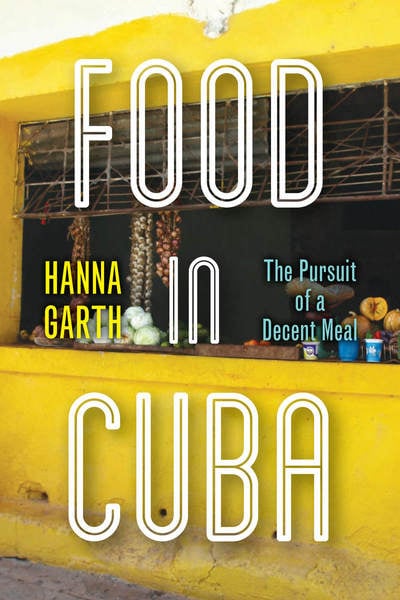 by Hanna Garth (Stanford University Press, 2020).
by Hanna Garth (Stanford University Press, 2020).
In Food In Cuba: The Pursuit of a Decent Meal (Stanford University Press, 2020), Hanna Garth examines the processes of acquiring food and preparing meals in the midst of food shortages.
Garth draws our attention to the social, cultural, and historical factors Cuban’s draw upon to define an appropriate or decent meal and the struggle they undergo to produce a decent meal. Often, studies of food security overlook the process of acquiring food, which Garth demonstrates as a critical locus for understanding food access.
Garth focuses on a variety of households, families, and individuals in Santiago, Cuba at different class levels and household compositions in order to show the gendered, racial, economic, social, and moral dimensions of how Cubans navigate their food landscapes and attempt to create culturally appropriate meals.
In so doing, she argues for the centrality of how local people determine their food system to be adequate. The book would be of interest to the areas of anthropology, particularly medical anthropology, food studies, Latin American Studies, Cuban studies, and studies of socialism and post-socialism.
Interview by Reighan Gillam.
Listen here!
Queer Palestine and the Empire of Critique
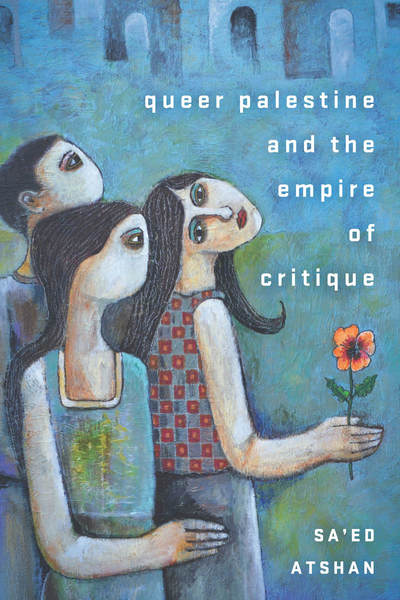 by Sa’ed Atshan (Stanford University Press, 2020).
by Sa’ed Atshan (Stanford University Press, 2020).
In Queer Palestine and the Empire of Critique (Stanford University Press, 2020) anthropologist and activist Sa’ed Atshan explores the Palestinian LGBTQ movement and offers a window into the diverse community living both in historic Palestine and in diaspora.
His timely and urgent account contends that the movement has been subjected to an “empire of critique,” which has inhibited its growth and undermines the fight against homophobia in the region and beyond. On the one hand, explains Atshan, queer Palestinians must contend with the harsh realities of patriarchal nationalism, homophobia and heteronormativity, Israeli occupation, dehumanizing discourses such as ‘pinkwashing,’ and the legacies of western imperialism.
At the same time, Atshan argues that critiques against such issues – leveled by academics, journalists, and even queer activists – have contributed to a stifling ideological purism that has put activists on the defensive and alienates some queer Palestinians.
Along with a succinct presentation of the immense challenges faced by the LGBTQ-identifying Palestinians, Atshan highlights Palestinian agency, ingenuity, and resilience. He considers how progressive social movements around the world can navigate the often fraught and complex dynamics of intersectional activism, and leaves his readers with a vision of a diverse queer Palestinian movement capable of “radically reimagining possible futures.”
Interview by Joshua Donovan.
Listen here!
The Universal Enemy: Jihad, Empire, and the Challenge of Solidarity
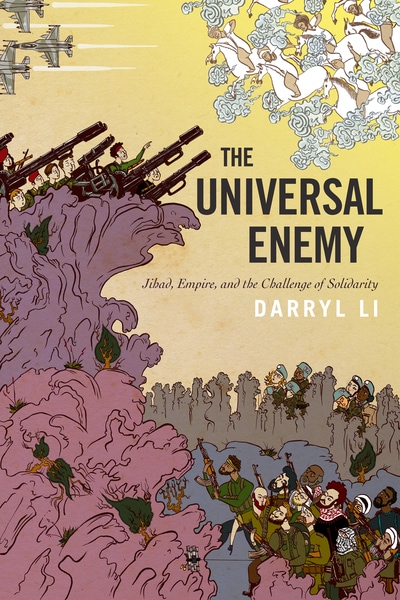 by Darryl Li (Stanford University Press, 2020).
by Darryl Li (Stanford University Press, 2020).
No contemporary figure is more demonized than the Islamist foreign fighter who wages jihad around the world. Spreading violence, disregarding national borders, and rejecting secular norms, so-called jihadists seem opposed to universalism itself. But in a radical departure from conventional efforts to explain and solve the “problem” of jihad, The Universal Enemy: Jihad, Empire, and the Challenge of Solidarity (Stanford University Press, 2020) begins with the assertion that transnational jihadists are in fact engaged in their own form of universalism: armed transnational solidarity under conditions of American empire.
Drawing on 15 years of interviews and research conducted in Arabic, Bosnian/ Serbian/ Croatian, Urdu, French, and Italian, and following the stories of former fighters across the Middle East, the Balkans, the United States, and Europe, anthropologist and attorney Darryl Li uses the lens of universalism to revisit the pivotal post-Cold War moment when ethnic cleansing in the Balkans dominated global headlines. Highlighting Bosnia-Herzegovina as a battleground of multiple universalisms—socialist Non-Alignment, United Nations peacekeeping, humanitarian intervention, the War On Terror, and the transnational jihads that posed an alternative to American governance—Li urges us to consider what grants claims to universalism their authority and allure.
A historical ethnography from below whose protagonists move between and beneath governments, The Universal Enemy explores the relationship between jihad and American empire, thereby shedding critical light on both.
Interview by Bhoomika Joshi and Nancy Ko.
Listen here!
Uncommon Anthropologist: Gladys Reichard and Western Native American Culture
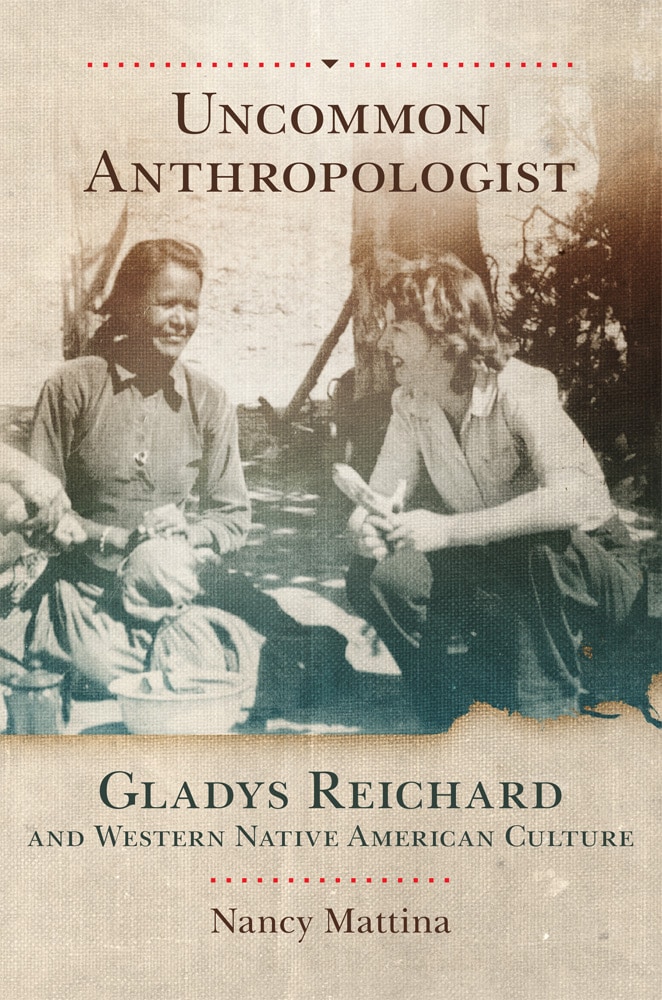 By Nancy Mattina (University of Oklahoma Press, 2019).
By Nancy Mattina (University of Oklahoma Press, 2019).
Protégé of Elsie Clews Parsons and Franz Boas, founder and head of Barnard College’s anthropology department, and a trailblazer in Native American linguistics and anthropology, Gladys Reichard (1893–1955) is one of America’s least appreciated anthropologists. Her accomplishments were obscured in her lifetime by differences in intellectual approach and envy, as well as academic politics and the gender realities of her age. Reichard’s approach to Native languages put her at odds with Edward Sapir, leader of the structuralist movement in American linguistics. Similarly, Reichard’s focus on Native psychology as revealed to her by Native artists and storytellers produced a dramatically different style of ethnography from that of Margaret Mead, who relied on western psychological archetypes to “crack” alien cultural codes, often at a distance.
Nancy Mattina‘s Uncommon Anthropologist: Gladys Reichard and Western Native American Culture (University of Oklahoma Press, 2019) is the first full biography of Reichard, and examines her pathbreaking work in the ethnography of ritual and mythology; Wiyot, Coeur d’Alene, and Navajo linguistics; folk art, gender, and language; and her exceptional career of teaching, editing, publishing, and mentoring.
In this episode of the podcast Nancy talk to host Alex Golub about Reichard’s life, her remarkable ethnography Spider Woman, her career as a teacher (including as an instructor of Zora Neale Hurston), how academic politics can erase people from disciplinary memory, and why Reichard’s ‘humanitarian’ values are needed now more than ever.
Interview by Alex Golub.
Listen here!
Harassed: Gender, Bodies, and Ethnographic Research
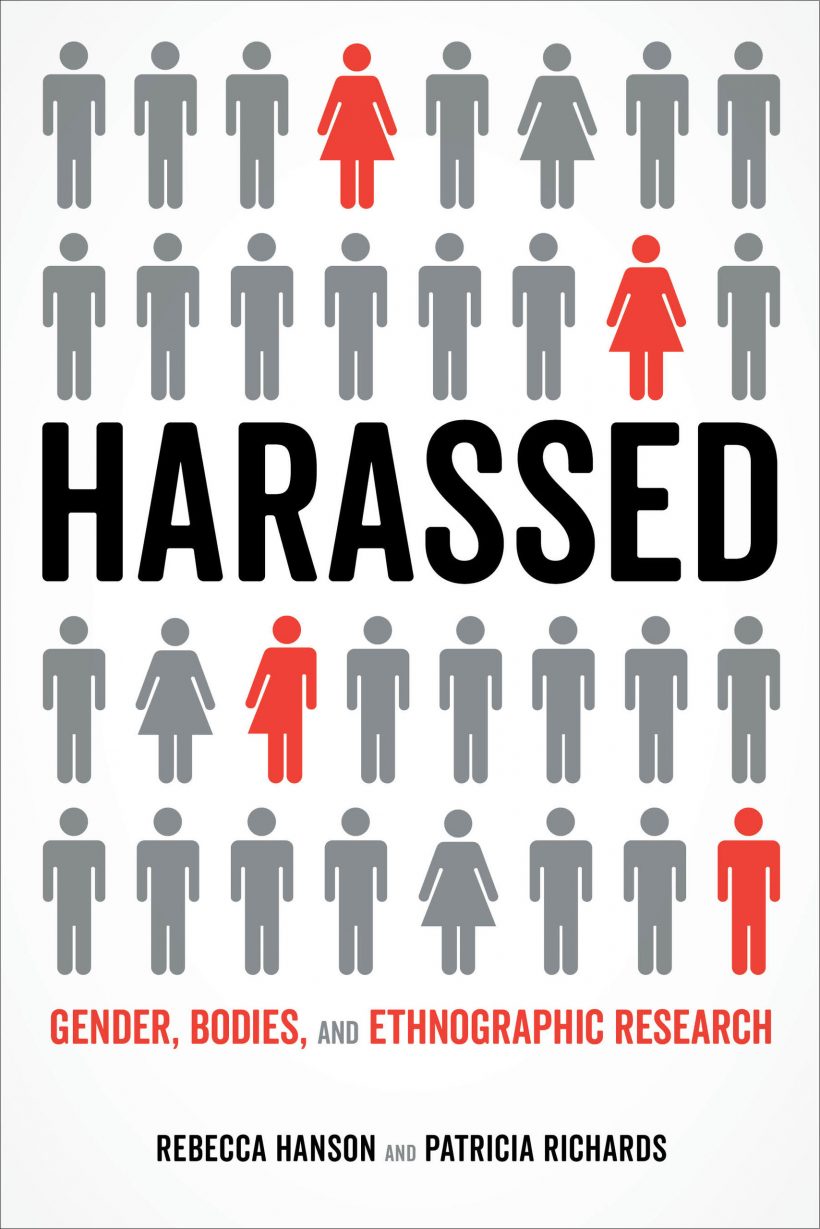 by Rebecca Hanson and Patricia Richards (University of California Press, 2019).
by Rebecca Hanson and Patricia Richards (University of California Press, 2019).
Researchers frequently experience sexualized interactions, sexual objectification, and harassment as they conduct fieldwork. These experiences are often left out of ethnographers’ “tales from the field” and remain unaddressed within qualitative literature.
In Harassed: Gender, Bodies, and Ethnographic Research (University of California Press, 2019), Rebecca Hanson and Patricia Richards argue that the androcentric, racist, and colonialist epistemological foundations of ethnographic methodology contribute to the silence surrounding sexual harassment and other forms of violence. Hanson and Richards challenge readers to recognize how these attitudes put researchers at risk, further the solitude experienced by researchers, lead others to question the validity of their work, and, in turn, negatively impact the construction of ethnographic knowledge. To improve methodological training, data collection, and knowledge produced by all researchers, Harassed advocates for an embodied approach to ethnography that reflexively engages with the ways in which researchers’ bodies shape the knowledge they produce. By challenging these assumptions, the authors offer an opportunity for researchers, advisors, and educators to consider the multiple ways in which good ethnographic research can be conducted. Beyond challenging current methodological training and mentorship, Harassed opens discussions about sexual harassment and violence in the social sciences in general.
Interview by Sneha Annavarapu.
Listen here!
Beauty, Femininity and South Asian American Culture
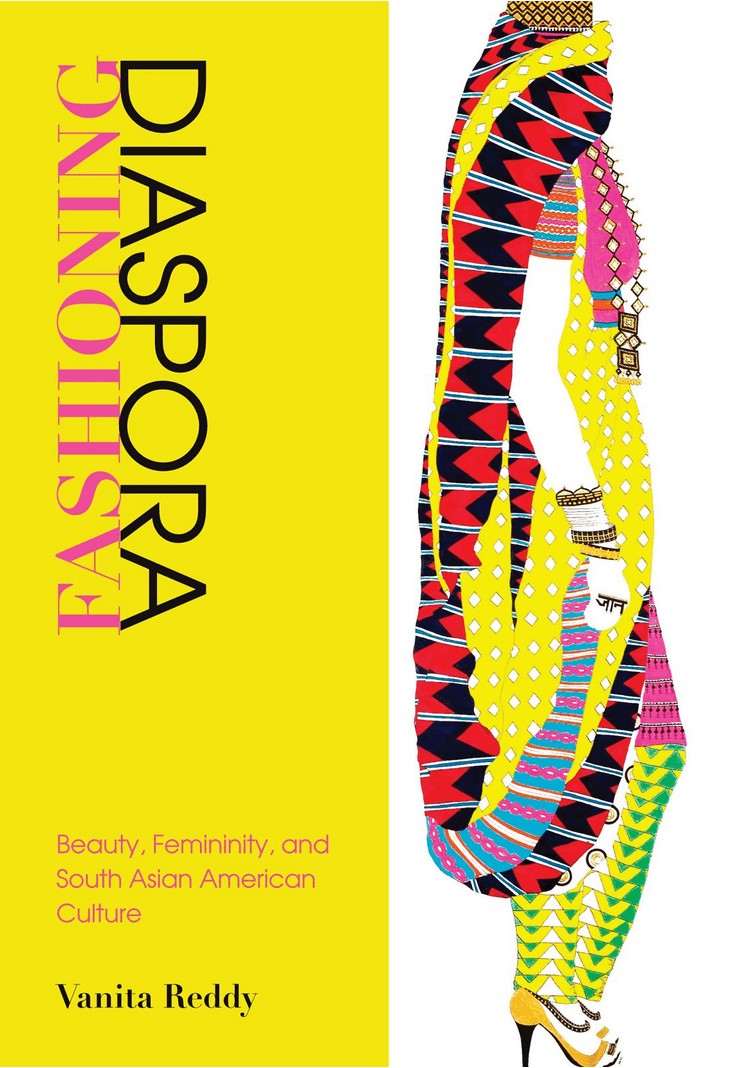 by Vanita Reddy (Temple University Press, 2016).
by Vanita Reddy (Temple University Press, 2016).
Vanita Reddy, in her book Fashioning Diaspora: Beauty, Femininity and South Asian American Culture (Temple University Press, 2016), locates diasporic transnationality, affiliations and intimacies through the analytic of beauty.
Through her analysis of Asian American literary fiction and performance artwork and installations, Reddy lingers on moments, objects and subjective positions that reveal the potentiality of beauty. Not just a site for neoliberal complicity, beauty, in its presence as well as absence, also emerges as something subversive.
The re-articulation of the bindi and the saree, objects that are otherwise imbued with upper-caste, Hindu hetero-reproductive symbolisms, in the works of performance artists, offer queer queer subversion of power structures. Beauty also becomes the site of not just physical but also social (im)mobility as Reddy presents the complicated ways in which beauty relates to aspiration.
Central to her project is upending the male-centric understanding of the relationship between the diaspora and the “nation”. Focussing not only on female narratives of movement and mobility but also interrogating the vulnerability and queer-ness of male subject positions, Reddy provides a nuanced interrogation of how “frivolous” beauty becomes the site of transformative transnational journeys.
In the first three chapters, she looks at the literary fiction that either centrally or marginally deploys beauty as the site of narrating stories about the diaspora. Chapter 4 and 5 look at feminist performances and cyber representations of objects like the bindi and saree that deliberately challenge the essentialization of these objects and destabilizes them not just to narrate stories of movement but emphasize potential for mobilization through seemingly non-serious, beautiful artifacts.
Vanita Reddy is an Associate Professor of English at Texas A&M University.
Interview by Lakshita Malik.
Listen here!
Black Middle-Class Britannia: Identities, Repertoires, Cultural Consumption
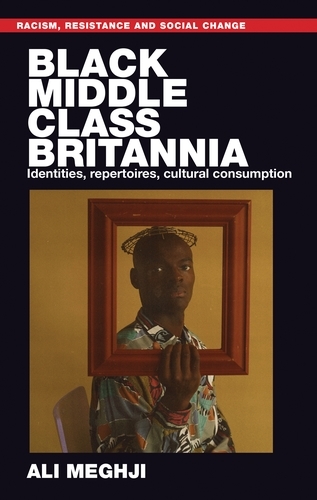 by Ali Meghj (Manchester University Press, 2019).
by Ali Meghj (Manchester University Press, 2019).
Who are the Black middle-class in Britain?
In Black Middle-Class Britannia: Identities, Repertoires, Cultural Consumption (Manchester University Press, 2019) Ali Meghj, a lecturer in social inequalities at the University of Cambridge, considers the identity of Britain’s Black middle-class by understanding culture and cultural consumption.
Offering examples from across contemporary art and culture, the book provides both a theoretical framework and rich empirical data to demonstrate the importance of understanding race to the study of both class and culture.
As a result, the book is essential reading across the arts and social sciences, as well as for cultural practitioners and policymakers.
Interview by Dave O’Brien.
Listen here!
Working in Public: The Making and Maintenance of Open Source Software
by Nadia Eghbal (Stripe Press, 2020).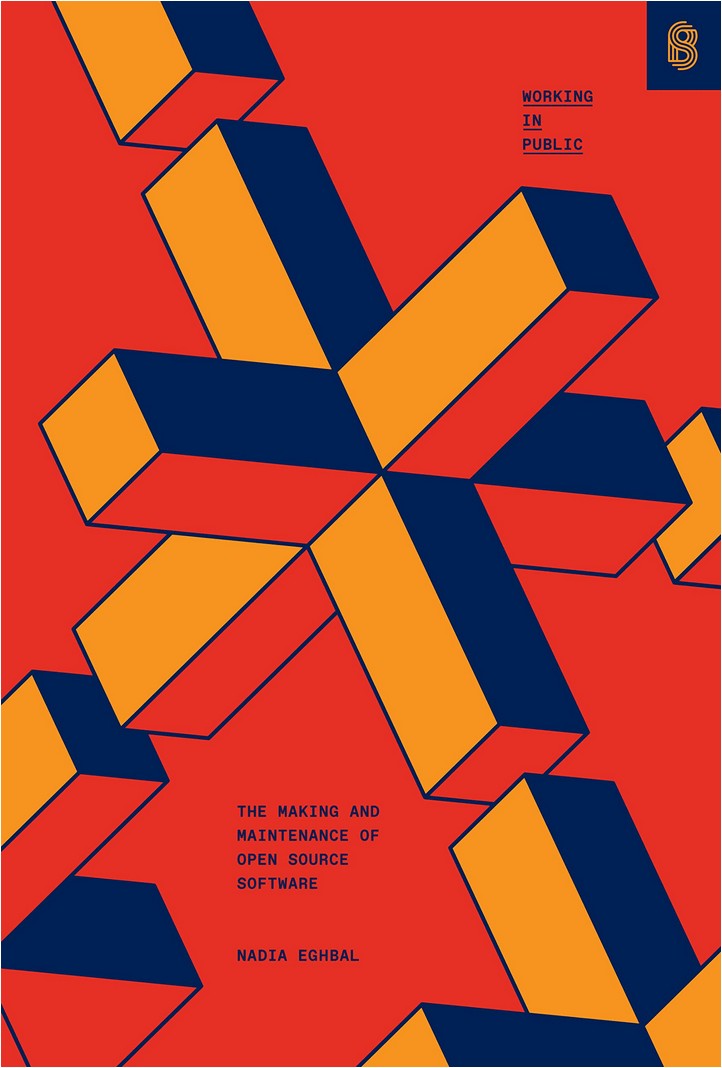
Open source is the once-radical idea that code should be freely available to everyone. Open-source software was once an optimistic model for public collaboration, but is now a near-universal standard. But most open-source code is not developed by big teams or equitable collaborations; it’s maintained by unseen individuals who work tirelessly to write and publish code that’s consumed by millions.
In Working in Public: The Making and Maintenance of Open Source Software (Stripe Press), Nadia Eghbal takes an inside look at modern open source software development and its evolution over the last two decades. The book draws from hundreds of interviews with developers, and serves as a first-of-its-kind anthropological investigation of the open source community.
Eghbal examines the role of GitHub as a platform for hosting code, the way software developers are (and often aren’t) compensated for their work, and the complex dynamics between maintainers, contributors, and users of open-source software.
Nadia Eghbal is a writer and researcher who explores how the internet enables individual creators. From 2015 to 2019, she focused on the production of open source software, working independently and at GitHub to improve the open source developer experience.
Interview by Matthew Jordan.
Listen here !
Featured Photo: Supermarket in Cuba, photo by Alessandro Caproni, found on PxHere.

